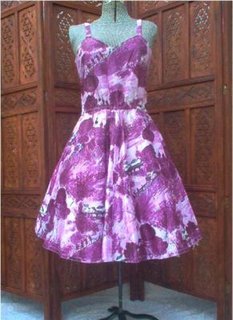

The onion domes in the distance evoke Eastern Europe on this 1970's faux taffeta number that you can bid on here, on offer from Frisky Frocks Vintage.
It's hard to tell if the dress is actually purple or plum from the photos, though it is listed as fushia (B34, W30). I feel for the little stick figures, looks like their harvest, or whatever doomed pastoral this represents, is not going well. Or perhaps the cossacks have just riden through and taken everything. But then again, maybe it's all projection on my part and they are in fact cheerfully planting kasha or something. Maybe it's just some ancestral Post-Traumatic-Stress-Disorder of mine. After all, I do have a recurring nightmare about a village on fire. I often believe that the traumatic memories of one's ancestors are passed along with DNA. Though the skeptic in me thinks it might be a by-product of watching Tarkovsky movies, especially Andrei Rublev.
Okay then, I'll call this the Andrei Rublev dress. Perfect to wear when falling from a hot air balloon, having a crisis of faith, or when your town is invaded by Tatars. Faux taffeta is virtually indestructible, so this frock could come through just about anything unharmed and unwrinkled.
At the risk of showing my age, I am reminded of Seinfeld episode with Elaine writing copy for the J. Peterman catalog. Perhaps my yearnings for vintage novelty prints are tinged with all the nostalgia, purple prose and colonialism of the defunct J. Peterman catalog? Or maybe they should be? Eleanor Hershey has a fabulous essay on the conjunction of the J. Peterman catalogue and the Seinfeld show called "It'll always be Burma to Me": J Peterman on Seinfeld, published in the Studies in Popular Culture Journal (1999, Vol. 22.3). While Seinfeld writers were critical of the obnoxious colonialist nostalgia and consumerism of the catalogue, they nonetheless re-enforce multiple stereotypes. You can read her essay here.
Hersey also points about the priceless final switcheroo of the Seinfeld and J. Peterman enterprises: "Ironically, however, the television show that was famous for its sarcasm and emotional detachment ended in a blaze of nostalgia and regret, whereas the demise of the highly nostalgic J. Peterman catalogue met with satire and journalistic glee."


0 Comments:
Post a Comment
<< Home